
Sony Inzone M10S review: beautiful design, uncompromising performance
Sony
Inzone
M10S:
Two-minute
review
The
Sony
Inzone
M10S
is
a
major
departure
from
the
rest
of
the
Sony
Inzone
monitor
lineup.
Known
for
PlayStation-oriented
products
and
closely
associated
with
many
of
the
best
monitors
for
PS5,
it
might
come
as
a
surprise
that
this
27-inch
OLED
display
has
been
designed
specifically
for
competitive
PC
gaming.
Its
sleek
black
aesthetic
is
a
major
shift
from
the
PS5-inspired
white
panel
look
of
the
Sony
Inzone
M9
and
Sony
Inzone
M3
too,
potentially
pointing
towards
a
more
standalone
future
for
the
brand.
If
that
is
the
new
trajectory
of
the
Sony
Inzone
name,
then
it’s
off
to
an
incredibly
promising
start.
This
first
foray
into
the
PC
esports
market
is
a
huge
success.
The
Sony
Inzone
M10S
is
expensive
compared
to
most
of
the
competition,
but
that
high
price
tag
is
reflected
in
almost
every
facet
of
the
monitor’s
top-notch
overall
design,
features,
and
performance.
The
1440p
OLED
panel
offers
a
lightning-fast
0.03ms
gray-to-gray
response
time
and
a
wonderfully
smooth
480Hz
refresh
rate,
ensuring
that
no
part
of
your
performance
in
intense
competitive
first-person
shooters
like
Counter-Strike
2
and
Valorant
is
held
back
by
your
monitor’s
technical
specs.
It
also
offers
some
genuinely
useful
visual
settings,
including
a
dedicated
24.5-inch
display
mode
that
accurately
simulates
a
tournament
experience
by
mirroring
the
standard
tournament
monitor
size.
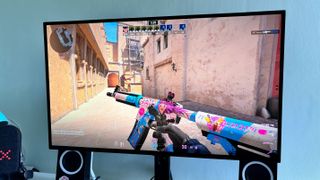
(Image
credit:
Future)
The
FPS
Pro+
mode
is
also
a
surprising
highlight.
By
default,
it
creates
an
almost
gray,
desaturated-looking
picture
but
seems
to
significantly
boost
the
appearance
of
primary
colors
like
Red
and
Green.
This
helps
key
UI
elements,
like
the
red
enemy
indicators
in
Call
of
Duty:
Modern
Warfare
3
stand
out,
improving
your
ability
to
see
vital
information
when
it
counts.
The
stand
of
the
Sony
Inzone
M10S
is
also
superb.
It
combines
an
impressively
small,
disk-like
base
constructed
from
durable
metal
with
an
attractive
monitor
arm
that
offers
a
full
360-degree
rotation.
The
base
takes
up
very
little
desk
space
and
can
easily
fit
underneath
an
elevated
keyboard,
allowing
you
to
easily
achieve
a
wide
range
of
positions
and
focus
entirely
on
your
game
rather
than
trying
to
fit
everything
on
a
single
surface.
It
also
has
plenty
of
elevation
options,
with
30
degrees
of
tilt
and
an
adjustable
height
of
up
to
12
cm.
Although
plainer
than
other
Sony
Inzone
models,
the
Sony
Inzone
M10S
looks
fantastic
overall
thanks
to
its
seriously
thin
side
profile
and
understated,
classy
aesthetic.
From
an
esports
perspective,
the
Sony
Inzone
M10S
delivers
in
all
respects
and
is
easily
one
of
the
best
gaming
monitors
out
there
today.
That
said,
there
are
more
suitable,
cheaper
options
for
those
who
want
something
geared
towards
general
gaming.
The
Sony
Inzone
M10S
does
not
feature
any
in-built
speakers
and
fans
of
sprawling
adventures
like
Horizon
Forbidden
West
may
prefer
a
lower
refresh
rate
but
a
higher
4K
resolution
panel
to
really
soak
in
all
the
details.
Although
the
Sony
Inzone
M10S
does
have
an
automatic
in-built
PS5
mode,
which
works
well
on
the
whole,
dedicated
console
players
will
also
be
better
off
with
alternatives
as
the
console
is
unable
to
make
full
use
of
this
model’s
480Hz
refresh
rate.
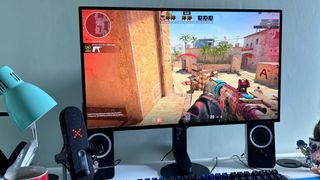
(Image
credit:
Future)
Sony
Inzone
M10S:
Price
and
availability
-
$1099.99
/
£1,199 -
Pricey
for
1440p -
Available
via
Sony
The
Sony
Inzone
M10S
is
avaiable
for
$1,099.99
/
£1,199
via
Sony.
This
is
towards
the
higher
end
of
what
you
would
expect
to
pay
for
a
1440p
OLED
monitor,
though
there
are
few
points
of
comparison
due
to
the
lack
of
many
other
1440p
models
at
480Hz.
Still,
there
are
some
slightly
cheaper
alternatives
with
similar
specs
out
there,
like
the
Asus
ROG
Swift
PG27AQDP
which
costs
$999
/
£949.
Whether
the
Sony
Inzone
M10S
is
worth
it
for
you
will
come
down
to
just
how
willing
you
are
to
pay
extra
for
its
esports
features
and
more
premium
design.
Of
course,
the
monitor
is
also
likely
to
receive
discounts
sometime
after
launch
as
we’ve
typically
seen
from
other
Inzone
models.
If
you’re
able
to
find
it
around
the
price
of
other
480Hz
OLED
1440p
displays
in
a
few
months
time,
then
it’s
a
no-brainer.
If
you’re
willing
to
sacrifice
the
refresh
rate,
you
can
easily
find
4K
OLED
monitors
like
Alienware
AW3225QF
for
around
the
same
price
as
the
Sony
Inzone
M10S.
While
1440p
(or
lower)
is
the
preferred
resolution
of
competitive
gamers
to
maximize
performance,
these
would
be
better
options
for
more
general
players
and
PS5
(or
soon
to
be
PS5
Pro)
owners
who
want
to
make
the
most
of
their
console’s
visual
capabilities.
Sony
Inzone
M10S:
Specs
to
scroll
horizontally
| Price |
$1099.99 / £1,199 |
|
Panel size |
27-inch |
|
Panel type |
OLED |
| Resolution |
2560 x 1440 |
| Brightness |
1,300 nit |
| HDR |
HDR True Black 400 |
|
Pixel response |
0.03ms gray-to-gray |
|
Refresh rate |
480Hz |
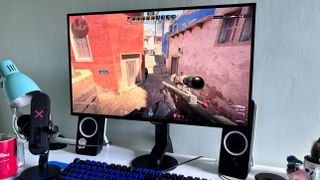
(Image
credit:
Future)
Sony
Inzone
M10S:
Design
and
features
-
Near-perfect
stand -
Useful
visual
modes -
OLED
burn
in
protections
The
star
of
the
Sony
Inzone
M10S’s
design
is
easily
its
stand.
It’s
an
impressive
piece
of
engineering
that
is
incredibly
stable
despite
its
distinctive
shape.
It
features
a
small
integrated
cable
tidy,
which
I
found
offered
more
than
enough
room
for
two
HDMI
cables,
a
display
port
cable,
and
the
monitor’s
power
cable
at
the
same
time.
The
base
of
the
stand
is
a
4
mm
thin
metal
disk
with
a
15.9
cm
diameter,
which
is
brilliantly
compact
compared
to
the
large
profile
of
most
gaming
monitors.
The
base
is
thin
enough
to
sit
beneath
a
keyboard,
freeing
up
desk
space
and
allowing
for
a
wide
range
of
possible
playing
positions.
It
also
offers
a
smooth
360-degree
pivot,
making
it
easy
to
adjust
viewing
angles
or
change
the
position
of
the
display.
You
can
also
tilt
the
panel
down
by
5
degrees
or
up
by
25
degrees
for
even
more
precise
adjustment.
No
matter
your
choice
of
position,
the
stand
remains
perfectly
balanced
and
stable
which
means
no
annoying
wobble
if
you
slam
down
on
keys
while
you
play.
The
fact
that
the
LED
power
indicator,
located
on
the
right-hand
side
of
the
monitor,
is
invisible
when
viewed
from
the
front
helps
further
reduce
distractions.
On
the
back
of
the
monitor,
you
will
find
a
large
power
button
and
a
small
thumbstick
for
editing
the
settings.
This
is
accomplished
through
an
on-screen
menu,
with
a
range
of
intuitive
tabs
for
all
your
picture
modes,
gaming
assist,
and
other
settings
options.
The
interface
is
nothing
groundbreaking,
but
it
all
works
well
and
offers
a
high
degree
of
customizability.
At
launch,
the
Sony
Inzone
will
also
be
compatible
with
the
existing
Inzone
Hub
PC
software
which
will
offer
another
way
to
adjust
these
settings.
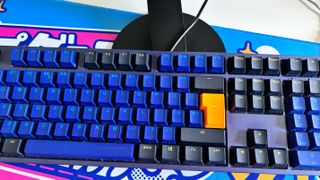
(Image
credit:
Future)
In
terms
of
dedicated
gaming
features,
you
get
full
Nvidia
G-sync
support
in
addition
to
Vesa
Certified
Adaptive
Sync.
The
monitor
also
offers
Display
HDR
True
black
400
HDR,
allowing
for
more
vibrant
colors.
It
is
worth
noting
that
some
visual
settings,
including
the
brilliant
FPS
Pro+
mode,
are
not
compatible
with
HDR
though.
The
in-built
brightness
equalizer
does
a
formidable
job
eliminating
the
slight
unevenness
associated
with
OLED
panels
and
the
optional
black
equalizer
increases
the
brightness
of
dark
scenes
to
improve
visibility.
Like
some
other
gaming
monitors,
there’s
an
in-built
frame
rate
counter,
timer,
and
series
of
green
or
red
on-screen
crosshairs
that
are
a
lot
of
fun
to
play
around
with
if
you’re
trying
to
land
some
no-scope
AWP
hits
in
Counter-Strike
2.
There’s
also
a
dedicated
24.5-inch
display
mode,
which
introduces
black
bars
around
the
screen
to
simulate
the
24.5-inch
size
of
a
tournament
display.
The
possibility
of
burn-in
is
always
a
worry
with
any
OLED
monitor,
but
the
Sony
Inzone
M10S
offers
a
good
selection
of
settings
to
combat
it.
This
ranges
from
a
mode
that
automatically
dims
your
screen
after
a
few
moments,
to
one
that
targets
and
dims
static
images
and
a
pixel
shift
that
almost
unnoticeably
moves
your
screen
picture
by
a
row
of
pixels
every
few
hours.
They
all
work
as
expected,
but
I
did
quickly
disable
the
setting
that
dims
static
images
as
the
occasional
change
in
brightness
of
the
taskbar
was
quite
distracting.
Sony
Inzone
M10S:
Performance
-
Leading
performance -
480Hz
is
beautifully
smooth -
Ideal
for
Counter-Strike
or
Valorant
There
is
no
way
to
fault
the
performance
of
the
Sony
Inzone
M10S.
The
480Hz
refresh
rate
and
0.03
GtG
response
time
create
a
wonderfully
smooth
experience.
Going
from
a
75Hz
and
a
144Hz
display,
the
difference
was
immediately
noticeable
and
made
for
a
much
more
responsive
experience
in
Counter-Strike
2.
Rocket
League
was
also
a
delight,
as
were
Tom
Clancy’s
Rainbow
Six
Siege,
and
Valorant.
A
lot
of
this
excellence
will
depend
heavily
on
your
PC
specs
though,
and
I
had
to
spend
a
little
while
tweaking
settings
in
order
to
achieve
anywhere
close
to
a
solid
480
fps
at
1440p
in
most
esports
titles.
The
default
color
configurations
are
all
solid,
but
the
monitor
was
quite
dim
out
of
the
box
presumably
as
a
power-saving
measure.
This
was
quickly
remedied
by
increasing
the
brightness
to
around
the
80%
mark,
which
I
found
hit
the
perfect
balance
of
brightness
and
clarity.
Throughout
my
testing,
I
observed
zero
ghosting
no
matter
what
I
threw
at
the
monitor.
On
top
of
the
excellent
FPS
Pro+
mode,
there’s
a
more
conventional
FPS
Pro
mode
that
offers
a
less
drastic
version
of
the
same
effect
in
addition
to
a
MOBA/RTS
setting
and
your
usual
range
of
Cinema
and
Game
modes.
Outside
of
FPS
games,
I
would
recommend
keeping
the
monitor
on
either
the
Standard
or
sRGB
setting
for
the
most
accurate
and
well-balanced
color
profiles
or
enabling
HDR.
Although
it
looks
nothing
like
previous
Sony
Inzone
monitors,
the
Sony
Inzone
M10S
does
still
offer
some
PlayStation-specific
features.
This
includes
an
automatic
PS5
mode,
which
is
enabled
when
the
monitor
detects
that
it’s
connected
to
a
PS5.
PC
gaming
is
definitely
the
focus,
but
everything
that
I
tested
on
PS5
from
Grand
Theft
Auto
5
to
Star
Wars
Outlaws
and
Doom
Eternal
also
looked
absolutely
stunning
with
HDR
and
the
vibrant
OLED
colors.
This
isn’t
a
model
that
you
should
buy
specifically
for
PS5
gaming,
but
this
will
be
good
for
those
players
who
rely
on
a
PC
for
competitive
shooter
titles
but
prefer
to
experience
games
like
RPGs
or
adventure
games
with
a
console.
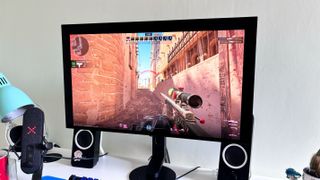
(Image
credit:
Future)
Should
you
buy
the
Sony
Inzone
M10S?
Buy
it
if…
Don’t
buy
it
if…
Also
consider
If
you’re
not
sure
whether
the
Sony
Inzone
M10S
is
for
you,
then
consider
these
two
strong
alternatives.
to
scroll
horizontally
|
Row 0 – Cell 0 |
Sony Inzone M10S |
Alienware AW3225QF |
Gigabyte M32UC |
| Price |
$1099.99 / £1,199 |
$1,199.99 / £989 |
$799 / £681 |
|
Panel size |
27-inch | 31.6-inch | 32-inch |
|
Panel type |
OLED | OLED | LCD |
| Resolution |
2560 x 1440 |
3840 x 2160 |
3840 x 2160 |
| Brightness |
1300 nit |
1000 nit |
350 nit |
| HDR |
HDR True Black 400 |
HDR True Black 400 |
HDR True Black 400 |
|
Pixel response |
0.03ms gray-to-gray |
0.03ms gray-to-gray |
1 ms |
|
Refresh rate |
480Hz | 240Hz | 144Hz |

(Image
credit:
Future)
How
I
tested
the
Sony
Inzone
M10S
-
Tested
with
a
variety
of
competitive
games -
Used
as
my
primary
monitor -
Available
profiles
and
settings
tested
I
tested
the
Sony
Inzone
M10S
for
over
a
week.
During
that
time,
I
used
the
monitor
as
my
main
display
for
both
PC
and
PS5
gaming.
I
played
a
wide
variety
of
esports
titles,
including
Counter-Strike
2,
Valorant,
Rocket
League,
Fortnite,
Tom
Clancy’s
Rainbow
Six
Siege,
Counter-Strike:
Source,
and
more.
I
also
tried
a
few
older
titles,
including
some
multiplayer
matches
of
Quake
2.
I
played
predominantly
in
1080p
and
1440p
in
the
27-inch
mode,
though
I
also
played
a
handful
of
matches
with
the
24.5-inch
setting
enabled.
During
my
time
with
the
monitor,
I
endeavored
to
test
each
of
its
available
features.
This
included
the
various
display
profiles
and
the
in-built
crosshair
settings.
I
played
a
broad
mix
of
games
on
PS5,
including
Call
of
Duty:
Modern
Warfare
3
and
a
few
hours
of
Horizon
Forbidden
West.
I
compared
my
experience
to
my
hands-on
testing
of
other
gaming
monitors
and
TVs
throughout.
First
reviewed
September
2024





